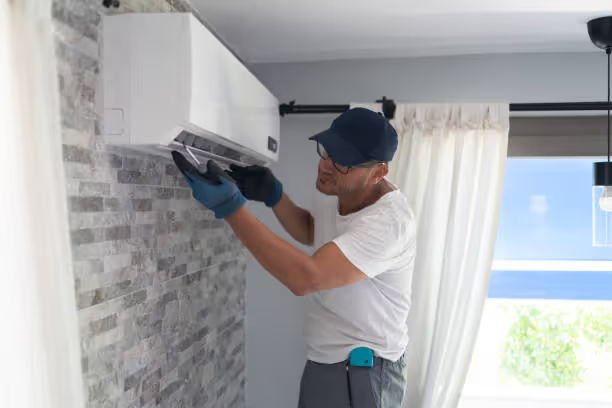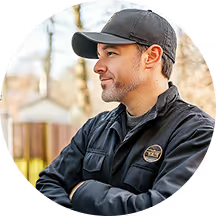AC Repair in Long Beach, NY
Keeping your home cool and comfortable in Long Beach, NY means dealing with humid summers, salty coastal air, and frequent peak-demand days. When an air conditioner fails, it’s more than an inconvenience it can affect indoor air quality, lead to higher energy bills, and, in severe cases, cause moisture-related damage. This page explains emergency and routine AC repair services tailored for Long Beach homes: common failure symptoms, the diagnostic steps technicians take, typical repairs and parts replaced, realistic response expectations, warranty and service guarantee details, and how to schedule service online or by phone.

Why prompt AC repair matters in Long Beach, NY
Long Beach’s coastal climate intensifies common HVAC issues. High humidity makes systems work harder, increasing wear on compressors and coils. Salt spray promotes corrosion on outdoor units and electrical connections. Many homes and condos in the area are older or compact, which can complicate airflow and ductwork issues. Addressing AC problems quickly reduces the risk of component failure, prevents mold and humidity damage, and restores comfortable indoor conditions faster.
Common AC problems in Long Beach homes
- No cooling or reduced cooling capacity: Often caused by refrigerant leaks, failing compressors, clogged filters, or a malfunctioning thermostat.
- Frequent short-cycling: System turns on and off quickly — typically due to refrigerant issues, a failing capacitor, thermostat placement, or oversized/undersized equipment.
- Strange noises from indoor/outdoor unit: Rattling, banging, or screeching can indicate loose panels, failing fans, motor bearings, or compressor trouble.
- Frozen evaporator coil: Caused by restricted airflow (dirty filters or blocked ducts) or low refrigerant levels. Coastal humidity can exacerbate frost and condensation problems.
- Water leaks or pooling around the indoor unit: Usually a blocked condensate drain, float switch activation, or failed condensate pump — important to fix quickly in homes with limited crawlspace.
- Electrical failures or tripped breakers: Corrosion on outdoor unit terminals, age-related wear on capacitors and relays, or poor wiring connections common in older Long Beach properties.
- Poor airflow or hot rooms: Duct leakage, closed vents, failing blower motors, or a dirty evaporator coil.
How technicians diagnose your AC
Technicians follow a structured diagnostic process to pinpoint the root cause before recommending repairs:
- Intake and symptom verification: Confirm homeowner observations — noise, no cool air, leaks, odors, or thermostat behavior.
- Visual inspection: Check outdoor unit condition for corrosion, debris, and proper clearances; inspect indoor unit, filters, coils, and condensate line.
- Electrical testing: Measure voltage, amperage, and continuity on capacitors, contactors, motors, and compressors. Coastal corrosion often shows up at terminals and connections.
- Refrigerant assessment: Check pressures and temperatures to detect leaks or under/overcharge conditions.
- Airflow and duct evaluation: Use airflow meters or static pressure checks to identify blockages, duct leaks, or failing blowers.
- System performance check: Measure supply and return temperatures, run-time behavior, and thermostat calibration to confirm repair needs.
Technicians document findings and explain options in plain language so you understand why a repair or replacement is recommended.
Typical repairs and parts commonly replaced
- Refrigerant leak repair and recharge: Locate and seal leaks, replace faulty fittings, then recharge to proper specifications.
- Capacitor replacement: Replacing start/run capacitors for persistent start-up or running issues.
- Contactor and relay replacement: Addresses intermittent or failed electrical switching in the outdoor unit.
- Compressor repair or replacement: Compressor failures are serious; repairs vary from component replacement to full outdoor unit replacement depending on age and condition.
- Fan motor and blower motor replacement: Restores proper airflow and circulation.
- Evaporator or condenser coil cleaning and repair: Removes corrosion, dirt, and salt buildup to restore heat transfer efficiency.
- Condensate drain cleaning and pump replacement: Clears blockages and replaces failed pumps to stop leaks and prevent mold.
- Thermostat recalibration or replacement: Resolves inaccurate temperature control; upgrades to smart thermostats can improve efficiency.
- Electrical terminal and wiring repairs: Cleaning and replacing corroded terminals and securing wiring connections to prevent shorts and failures.
Parts selection often considers coastal-grade replacements (corrosion-resistant coatings or stainless fasteners) for Long Beach installations to extend service life.
Emergency vs routine repair: response expectations
- Emergency repairs: For total system failure on heat waves, major leaks, electrical hazards, or active water damage, expect prioritized scheduling and rapid on-site diagnosis. Typical emergency response aims for same-day or next-available dispatch depending on call volume and parts availability.
- Routine repairs: For non-emergency issues like reduced efficiency, minor noises, or thermostat problems, standard appointments are scheduled within a short window based on workload and location. Technicians bring common parts to complete most repairs in one visit.
Response time can vary seasonally; peak summer demand in Long Beach may extend wait times. Providing details about symptoms and system age when you request service helps prioritize correctly.
Warranty, service guarantees, and parts coverage
Reputable AC repair services typically offer:
- Manufacturer or parts warranties: New parts often include manufacturer-backed warranties. Technicians will note whether parts are covered and the duration of any warranty.
- Service guarantees: A workmanship guarantee covers the quality of the repair for a specified period. This covers improper installation or failures directly related to the repair work.
- Transparent documentation: You should receive written documentation of the diagnosis, recommended repairs, parts used, and warranty terms before work begins.
In coastal environments like Long Beach, ask about corrosion-specific warranties or recommended preventive coatings when replacing outdoor components.
Scheduling service in Long Beach, NY
Scheduling options generally include:
- Online booking: Use a service provider’s online scheduling form to select an available appointment window and describe symptoms. Include system make, model, and any recent issues to help the technician prepare.
- Phone scheduling: Call the service center to discuss symptoms and get guidance on emergency versus routine scheduling. Provide your address type (single-family home, condo, or apartment) and any access details so the technician can plan.
When scheduling, mention coastal exposure and system age; technicians can bring coastal-grade parts and additional diagnostic tools as needed.
Preventive tips and benefits of timely repair
- Change or clean filters monthly during peak season to maintain airflow and reduce coil icing.
- Keep the outdoor unit clear of sand, vegetation, and debris to reduce corrosion and airflow restriction.
- Schedule seasonal tune-ups to catch small issues early a well-maintained system runs more efficiently, lasts longer, and avoids emergency breakdowns during heat waves.
- Consider installing a smart thermostat and routine maintenance plan to balance comfort and energy use in Long Beach’s humid climate.
Timely repairs restore comfort quickly, improve system efficiency, reduce energy costs, and extend the life of your AC especially important for coastal homes where environmental stressors accelerate wear.
This guide outlines what to expect for AC repair in Long Beach, NY: common local failure symptoms, how technicians diagnose problems, typical repairs and parts replaced, response timing differences for emergencies, warranty coverage basics, and practical scheduling steps. The goal is clear, expert guidance so homeowners and property managers in Long Beach can make informed decisions when their cooling system needs attention.
Customer Testimonials
Hear directly from homeowners who trust Bobby O’s HVAC Inc. for fast response times, honest service, and lasting comfort.











